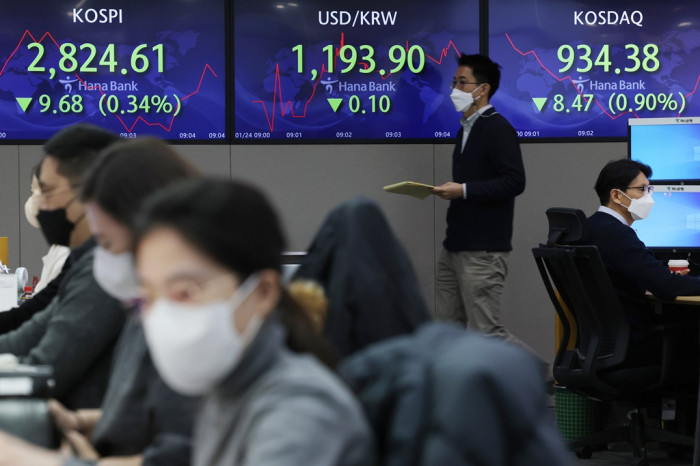Foreign exchange
Korea to reform FX market to join MSCI developed markets
Government to extend trading hours, mulls allowing offshore investors to directly trade won currency
By Jan 25, 2022 (Gmt+09:00)
3
Min read
Most Read
LG Chem to sell water filter business to Glenwood PE for $692 million


Kyobo Life poised to buy Japan’s SBI Group-owned savings bank


KT&G eyes overseas M&A after rejecting activist fund's offer


StockX in merger talks with Naver’s online reseller Kream


Mirae Asset to be named Korea Post’s core real estate fund operator



South Korea is set to reform the local currency market as the country aims to reach MSCI Inc.’s developed market status for its domestic stock markets.
The government plans to extend the operating hours of the country’s foreign exchange market and consider allowing offshore financial institutions to directly trade the won currency.
“The government will take into account ways to enhance foreign investors' market access and stabilize the FX market," Finance Minister Hong Nam-ki said during a meeting on external economic policy on Tuesday.
MSCI, which has been classifying South Korea’s stock market as an emerging market for years, said the country needs to improve its foreign exchange market to earn developed market status. MSCI is known to have also required a reform of the foreign investor registration rule and expansion of short-selling.
The finance ministry has said that the country will move to actively enhance its currency market system first as the upgrade of the status is expected to attract more foreign investors, especially global pension funds. Some said it is the right time to reform the market, given healthy external conditions with foreign exchange reserves at a record high and sovereign ratings stable.
The government will set up improvement plans around next month after collecting opinions from market players at home and abroad this month. Then it will start negotiations with MSCI, aiming to get the stock market placed on the watch list during the agency’s upcoming June review.
LONGER TRADING HOURS, DIRECT TRADING
The country is slated to increase the trading hours of the local currency market and deliberate on ways to permit offshore investors to trade the won.
Overseas investors have complained that they could not directly participate in the market and that it is difficult to exchange currencies after the local market closes, according to a finance ministry survey of 50 major global investors, which has been conducted since November last year.
Currently, the Seoul foreign exchange market opens at 9 a.m. local time and closes at 3:30 pm. The government is mulling an extension of the closing time to 6 p.m. or 1 a.m. the following day and is even considering 24-hour operations.
If each bank in the country adds a team of currency traders to work on extended market hours until 1 a.m. the next day in Seoul, which is 4 p.m. -- or 5 p.m. during daylight savings time -- in London where financial markets close at 4:30 p.m., foreign investors are unlikely to face much currency exchange difficulty, a body of South Korea’s FX market participants was understood to have proposed on Monday.
The government will also consider permitting offshore financial institutions to directly trade the won. Currently, only government-approved financial institutions in the country are allowed to participate in the market. In the long run, the country plans to fully liberalize foreign exchange market regulations to allow overseas financial institutions to trade the won in offshore markets.
“We will definitely push ahead with the extension of market hours. But we will decide by how much after collecting opinions from the industry,” said a finance ministry official.
NO VOLATILITY CONCERNS
Some argued such measures will increase the won’s volatility, but the government played down such concerns, saying the reform is expected to stabilize the market.
“It is difficult for the government to monitor the market under the current system since there are so many offshore deals after the domestic market closes,” said the ministry official.
“It is easier to manage volatility if we extend the market hours and bring the offshore trade to the local market.”
The current system was set up after the 1997-98 Asian financial crisis when the won plummeted. The government reduced the operating hours of the local currency market and tightened regulations on domestic financial institutions’ foreign exchange management in an aim to control the market.
Write to Jin-gyu Kang at josep@hankyung.com
Jongwoo Cheon edited this article.
More to Read
-
 MarketsShort-selling ban keeps Korea from MSCI’s developed-markets index
MarketsShort-selling ban keeps Korea from MSCI’s developed-markets indexJun 22, 2021 (Gmt+09:00)
3 Min read
Comment 0
LOG IN


